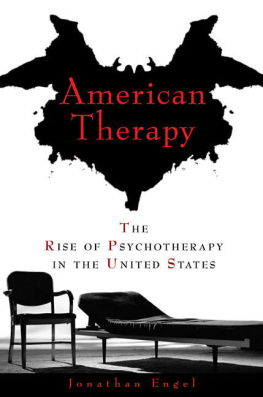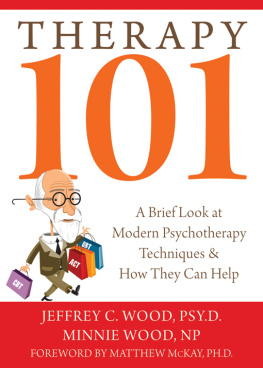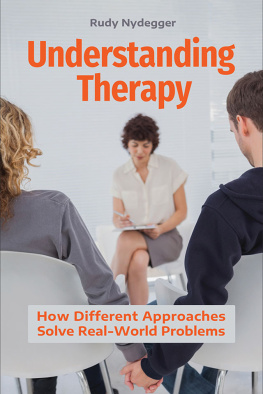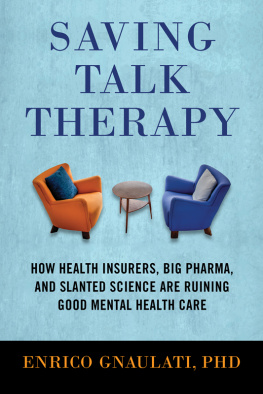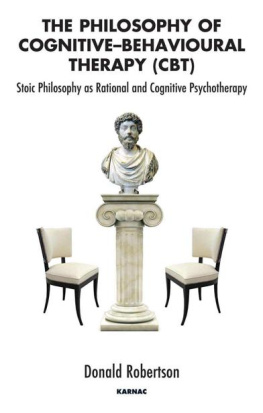Acknowledgments
Thank you to my research assistants Samantha Ehrlich and Angela Mastria for help in tracking down articles and for wading through microfilm footage; to Robert Guinsler of Sterling Lord Literistic for his eternal optimism, warmth, and tenacity; and to Jessica Sindler at Gotham, who improved the manuscript in countless ways. Rick Willett copyedited the manuscript with a deft torch. Barbara Ward, the inter-library loan guru of Seton Halls Walsh Library, is my unsung hero; without her this book would not exist. As always, thank you to Rozlyn for indulging my writing life.
Millburn, New Jersey
May 2008
Afterword
Psychotherapy works. For all of the doubts expressed by skeptics over the decades, none can credibly discount the evidence emerging from numerous studies that patients emerge from therapy feeling better. A consistent two-thirds of patients improve after six months of therapy, consulting with therapists from every educational background and using every type of therapeutic approach. And while many patients suffering psychic discomfort do improve on their own without therapy, they progress far more slowly and with higher rates of relapse. It is the difference between walking and driving; you can walk from coast to coast across the United States, but at a far slower pace, and with a far lower chance of succeeding, than if you drive.
The success of psychotherapy alone must be qualified, however. It works best with people who are not severely ill. Patients suffering from schizophrenia, bipolar disorder, and obsessive-compulsive disorder improve little with psychotherapy, although some do improve with psychotherapy used in conjunction with medication. In 1970, one dispassionate psychiatry researcher concluded that the most reasonable description of psychotherapy was that it was moderately successful in treating patients falling within a relatively narrow range of the full spectrum of disorders. And while both therapeutic technique and pharmacological interventions have improved over the past thirty years, the same can generally be said today.
Finding the right match between therapist and patient is critical to a successful therapeutic relationship, and it is part diagnostic accuracy, part chemistry, and part luck. Success has little to do with the type of training the therapist has undergone or his or her disciplinary orientation. Neither psychiatry nor psychology nor social work appears to have garnered technical superiority in dispensing therapy, and the precise terminal degree held appears to be nearly irrelevant. Moreover, the self-described philosophical approach of the therapistpsychodynamic, cognitive-behavioral, client-centered, or rational-emotiveseems to bear little on his or her ultimate success.
What is important is empathy. The great preponderance of patients report the need to feel comfortable and understood by their therapist; empathy is the precursor to the trust upon which a productive therapeutic relationship is built. Far more important than a therapists analytical brilliance and insight is his or her ability to connect with the patient, to understand the patients concerns, and to put the patient at ease.
The exact mechanism by which therapy works has never precisely been established. Some therapies allow for greater insight into trauma and fears, some help to reorganize patients thoughts, some help redirect their behaviors. Almost all, it seems, rely to some degree on actually teaching the patient a new set of skills or more productive thinking patterns, and thus more than anything the therapeutic relationship resembles that of tutor and pupil.We should not really be so surprised at the results of the famous Vanderbilt experiment in which distraught undergraduates improved after receiving therapy from untrained empathetic humanities professorsthe professors were simply adapting their natural teaching mien to a slightly different pedagogical problem. This also explains the need for therapy to end, for the successful relationship is less one of peer support than pedantry; at some point the pupil has mastered the lesson. Countering the Freudian emphasis on prolonged treatment, which had become the standard in the 1960s, Bennet Olshaker, a psychiatrist in Washington, D.C., noted in the 1970s, A good psychiatrist should be like a good parent; that is, he should eventually become dispensable.
And Freud? Have his vaunted contributions really come to so little? Yes and no. On one hand, most of his detailed models of the structure of the psyche have seen dismissed; few serious students of psychology or the mental health sciences continue to refer to ids and superegos. Neurological and psychological research over the past three decades has effectively disproved many of his theories regarding repressed memories, infantile sexuality, and the general psychosocial developmental sequence that he posed as normal. Freuds complexes, phobias, yearnings, and instincts have largely been superceded. His sexual constructs are laughably archaic; his reductive and ideological views of society and social tensions are inconsistent with more modern and practical understandings of realpolitik and economic growth. More than ever, we understand Freud to be a product of his time; highly significant within the spectrum of intellectual history, but with little relevance to our best understandings of the human mind.
Yet Freuds presence continues. His notion of an unconscious, his reliance on talk, and his speculation about the biological underpinnings of some mental illness have all proved true. Moreover, his fundamental insight into the complexity of the human mind has been validated many times over, and his inclination to believe that the best path to gaining insight into that complexity is through a healer listening to a patient forms the basis of virtually all successful psychotherapy.Thomas Gutheil of Harvard Medical School pithily summed up Freuds beliefs: First, theres a whole lot more to folks than meets the eye, and second, keep your mouth shut and you might learn something. That is, to help somebody in psychic distress, Freud taught us that there is no shortcut. People are complicated, and the therapist must take the time to tease out the complexities before he can help. We might all benefit from such insight in our everyday lives.
As for the organic nature of mental illness, we know much more than we did in Freuds time, yet we still have much to learn. Most mental disorders do have a chemical or physiological basis, and every day we get closer to understanding the precise neurochemical shortfalls or neuroelectrical abnormalities that cause particular psychic tics. The new medicines produced over the past half century have changed the shape of mental health care and promise to do more in the future. In this age of made-to-order psychopharmacology, however, psychotherapy still has an important role to play, for virtually all of the medications work best in conjunction with therapy. Patients cannot optimize their newly recalibrated brain chemistry without the personal tutorial in living life as a psychically healthy person that therapy provides.
At the same time, psychotherapy has proven to be only modestly successful in treating patients suffering from their own bouts of mismedication, with either alcohol or narcotics. These patients do need therapy, but of a particular sort uniquely suited to their own brands of illness.They, too, need to relearn how to live life, but seem able to do so only under the constant and overwhelming pressure of a highly judgmental and sanctimonious peer groupthe empathetic individual therapist has little to offer.The good news is that the group therapy provided by AA and Narcotics Anonymous does help; the bad news is that a high percentage of these patients will never muster the strength to commit to such prolonged and painful life change. Psychotherapy, whether dispensed individually or in groups, can work only when the patientthe pupildesires to learn. For the intransigent, hostile, and aloof patient, it has little to offer.

